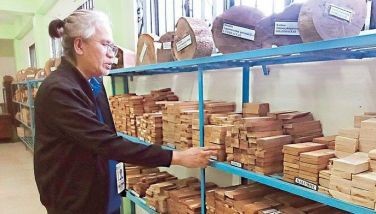Abolition of death penalty pressed
March 9, 2001 | 12:00am
Catholic bishops are pushing anew for the repeal of the death penalty law.
In a statement yesterday, the Catholic Bishops Confe-rence of the Philippines (CBCP) urged President Arroyo to ask Congress to abo-lish the death penalty.
Rodolfo Diamante, executive secretary of the CBCP’s Episcopal Commission on Prison Pastoral Care, said the trial court had shown "bias" against Edgar Maligaya, one of two death convicts whose sentences were commuted by President Arroyo to life imprisonment.
Maligaya and two others were given the death penalty after the court found them guilty of killing a Chinese businessman, he added.
Diamante said the trial court convicted Maligaya and his two accused based solely on the testimonies of witnesses presented by the prosecution.
Diamante said Maligaya was a victim of injustice, having been implicated in the murder case after he was identified by a vendor who had reportedly witnessed the crime.
However, Diamante said another witness, Al de Ocampo, who has been a volunteer in prison service for 20 years, testified to the innocence of Maligaya.
De Ocampo told the court that Maligaya was with his group in a litugical service at the time he was supposed to have killed the Chinese businessman.
Diamante said Maligaya’s case is "a classic example of how an innocent man" could be sentenced to death on the strength of a "police frame-up" or simple "bureaucratic negligence."– Sandy Araneta
In a statement yesterday, the Catholic Bishops Confe-rence of the Philippines (CBCP) urged President Arroyo to ask Congress to abo-lish the death penalty.
Rodolfo Diamante, executive secretary of the CBCP’s Episcopal Commission on Prison Pastoral Care, said the trial court had shown "bias" against Edgar Maligaya, one of two death convicts whose sentences were commuted by President Arroyo to life imprisonment.
Maligaya and two others were given the death penalty after the court found them guilty of killing a Chinese businessman, he added.
Diamante said the trial court convicted Maligaya and his two accused based solely on the testimonies of witnesses presented by the prosecution.
Diamante said Maligaya was a victim of injustice, having been implicated in the murder case after he was identified by a vendor who had reportedly witnessed the crime.
However, Diamante said another witness, Al de Ocampo, who has been a volunteer in prison service for 20 years, testified to the innocence of Maligaya.
De Ocampo told the court that Maligaya was with his group in a litugical service at the time he was supposed to have killed the Chinese businessman.
Diamante said Maligaya’s case is "a classic example of how an innocent man" could be sentenced to death on the strength of a "police frame-up" or simple "bureaucratic negligence."– Sandy Araneta
BrandSpace Articles
<
>
- Latest
- Trending
Trending
Latest
Trending
Latest
Recommended






























